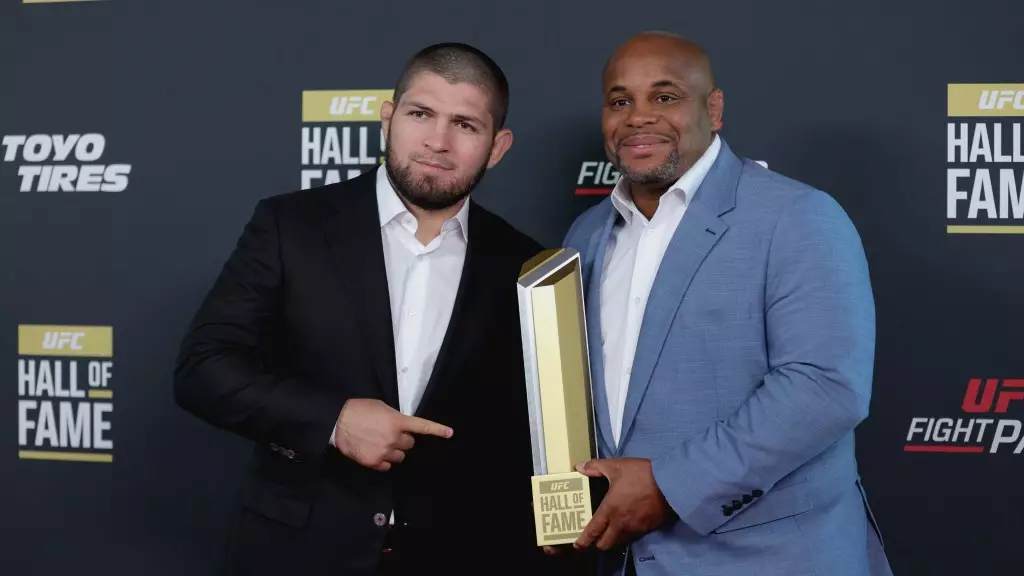Mixed martial arts (MMA) has always been a landscape dotted with intense rivalries and fierce competitions, but amidst the tumult, loyalty stands out as a core value for many fighters. A prime example of this loyalty can be observed in the relationship between former UFC champions Daniel Cormier and Khabib Nurmagomedov. Their journey together through the realm of combat sports offers insights not only into their personal bond but also the cultural implications that influence fighter dynamics, especially within the context of rivalries.
Cormier and Nurmagomedov’s friendship was forged in the fires of training together at the American Kickboxing Academy. Sharing drudging hours of sparring, they developed a mutual respect and camaraderie that transcends the octagon. Both fighters have not only experienced personal rivalries but have also handled the aftermath of others’ conflicts. Their intertwined experiences shape a narrative of loyalty often absent in the tempestuous world of MMA.
For Cormier, the relationship is not merely professional; it represents family bonds formed under pressure. This familial aspect weighs heavily, especially in light of Cormier’s own historical rivalry with Jon Jones. This ongoing conflict has drawn the line between friends and foes starkly in the MMA community, leading Nurmagomedov to take a principled stance regarding relationships affected by divisions.
During an exchange with Khabib, Cormier was made acutely aware of the cultural variances regarding loyalty and friendship. Cormier’s amicable relationship with his rival, Conor McGregor, contrasted sharply with Nurmagomedov’s perspective, providing a critical vehicle for examination. Cormier observed that while McGregor and he had shared friendly interactions, Nurmagomedov found these congenial exchanges unsettling due to his unwavering loyalty to Cormier.
Nurmagomedov’s response serves as a valuable lesson in the value of boundaries within friendships, particularly in environments fraught with animosity like the UFC. “If I see Conor with his wife, I’ll shake his hand because that’s what you’re supposed to do,” he said, delineating a clear distinction between personal courtesy and loyalty to friends. Cormier’s initial resistance to this perspective indicates a cultural disconnect; however, it also displays the personal growth that emerges when one considers another’s viewpoint seriously.
Upon reflecting on Khabib’s words, Cormier chose to recalibrate his approach towards dealing with rivals. This insightful shift demonstrates the profound effect that loyalty and respect can have in professional relationships. As Cormier matured in his understanding of loyalty, he pivoted from actively pursuing interviews with McGregor to a more reserved stance—a measure reflecting the weight he now places on his relationship with Nurmagomedov.
Cormier’s newfound appreciation for loyalty is framed by the contrast of how conflicts were traditionally managed within the American cultural context. He expressed admiration for Nurmagomedov’s steadfastness, noting, “They’re very stern in the side they pick,” revealing a refreshing honesty not commonly seen in American sports. In an atmosphere where alliances fluctuate, Khabib’s principles provide a stark contrast—ushering in an era where loyalty and camaraderie might outweigh opportunism.
The narratives woven between Cormier and Nurmagomedov highlight a unique perspective on loyalty in MMA, underscoring that camaraderie can exist even amidst personal rivalries. Their relationship challenges the pervasive notion that competition must somehow overshadow integrity and alliance. In a realm filled with ego and personal gain, their bond serves as a reminder that loyalty can and should play a pivotal role in every fighter’s journey.
As fans and participants of this brutal yet captivating sport continue to watch, the true essence of friendship and loyalty will undoubtedly remain at the forefront, reminding all that the most authentic connections often emerge from shared struggles and unwavering support.

